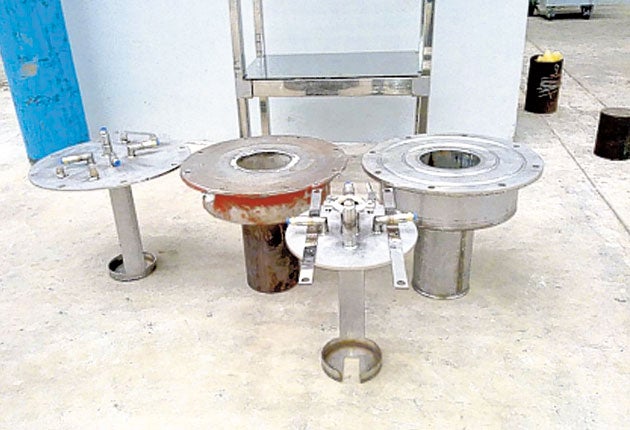Burmese junta 'is developing a nuclear threat'

Your support helps us to tell the story
From reproductive rights to climate change to Big Tech, The Independent is on the ground when the story is developing. Whether it's investigating the financials of Elon Musk's pro-Trump PAC or producing our latest documentary, 'The A Word', which shines a light on the American women fighting for reproductive rights, we know how important it is to parse out the facts from the messaging.
At such a critical moment in US history, we need reporters on the ground. Your donation allows us to keep sending journalists to speak to both sides of the story.
The Independent is trusted by Americans across the entire political spectrum. And unlike many other quality news outlets, we choose not to lock Americans out of our reporting and analysis with paywalls. We believe quality journalism should be available to everyone, paid for by those who can afford it.
Your support makes all the difference.Burma is trying to develop nuclear weapons, according to exiled journalists who claim to have uncovered evidence of a nascent missile programme.
Reporters working for the Democratic Voice of Burma (DVB), a respected dissident radio station that broadcasts into South-east Asia out of Oslo, say they have collected files and photographs which suggest that the country's ruling junta is mining and experimenting with uranium with the aim of one day creating a bomb.
If the evidence is substantiated, it could have severe implications for how the international community deals with the Burmese regime, one of the world's most reviled and isolated military dictatorships. The allegations prompted US senator Jim Webb to cancel an impending trip to Burma.
The bulk of the evidence comes from Sai Thein Win, a major in the Burmese army who was trained in missile technology in Burma and Russia and has since defected. Sai Thein Win claims to have worked in a series of secret facilities near the town of Myaing, 100km west of Mandalay, where he was ordered to make prototype components for missile and nuclear programmes. He also claims a further nuclear facility is located at Thabeikkyin, a town north of Mandalay that he visited on numerous occasions.
If Burma's alleged nuclear ambitions are substantiated, it will inevitably raise questions as to whether the junta is receiving help from rogue nations such as North Korea. Last week, a leaked UN report obtained by the Associated Press accused Pyongyang of defying UN sanctions by using front companies to export nuclear and missile technology to Iran, Syria and Burma. U.S. State Department spokesman P.J. Crowley said Washington has "been concerned about Burma's relationship with North Korea."
The full details of DVB's investigations are due to be released on the internet tomorrow, accompanied by a documentary which will air on Al Jazeera in Europe and ABC in the US. Khin Maung Win, deputy director of DBV, told The Independent yesterday: "We have been investigating Burma's nuclear aspirations for the past five years, but Sai Thein Win's evidence has been vital in proving that the intent to build a nuclear bomb is there, even if they are a long way off producing one."
Sai Thein Win began sending DVB photographs of Burma's secret facilities in November 2009 and continued to do so until early February when he fled the country. He is now in hiding.
Bertil Lintner, a Burma analyst based in Chiang Mai, Thailand, said obtaining such evidence from a high-level defector was very rare. "It's certainly some of the most extraordinary evidence I've ever seen coming out of Burma," he said, adding that Sai Thein Win's revelations were akin to Mordechai Vanunu's exposure of Israel's nuclear weapons programme in 1986.
According to Sai Thein Win, a specialist "nuclear battalion" has been created by Burma's rulers to begin experimenting with nuclear materials and long-range missile production.
He claims to have worked with precision machinery imported from Singapore and Germany that the Burmese government bought for "educational and vocational training", but was in fact used for uranium enrichment, and to produce parts for warheads.
DVB say they have had their evidence verified by two specialists: Robert Kelley, a former intelligence officer at Los Alamos and ex-weapons inspector with the International Atomic Energy Agency, and Geoff Forden, a military researcher at Massachusetts Institute of Technology.
Mr Kelley, who co-authored DVB's report, said he believed that Sai Thein Win's evidence showed that Burma has "no conceivable use for this for anything other than a nuclear weapons programme".
To read an executive summary of the dossier click here
Join our commenting forum
Join thought-provoking conversations, follow other Independent readers and see their replies
Comments